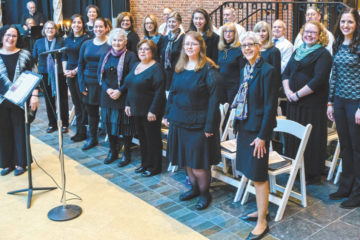DPO explores art of the cantor with Bernstein’s Jeremiah symphony

By Marshall Weiss, The Dayton Jewish Observer
Last summer, Cantor Jenna Greenberg found a handwritten note in her door from her next-door neighbor, Dayton Philharmonic Orchestra Artistic Director and Conductor Neal Gittleman.
“I want to pick your brain about something. Can you call me?” the note read.
For the 2018 Leonard Bernstein centennial, Gittleman programmed Bernstein’s Symphony No. 1, the Jeremiah, over the weekend of Jan. 19-21, including a Sunday Classical Connections program, in which he first explains the background of the work.
“It sets texts from the Book of Jeremiah and the Book of Lamentations,” Gittleman said of Bernstein’s first symphony, which he composed in 1942 and earned him the 1944 New York Music Critics’ Circle Award for best American work.
“Everywhere you read about this piece, program notes say that there are musical themes in the piece which were taken from Jewish liturgical sources,” Gittleman said, “but nobody anywhere ever says what they are.”

Gittleman looked to Greenberg to connect him to the origins of the work’s several Jewish musical motifs.
“They’re from either the nusach, the prayer modes, or from the trope, the cantillation of both Haftorahs (portions of the Prophets),” Greenberg said. “The Haftorah trope is quoted throughout the piece, as well as the cantillation for Lamentations. Jeremiah is considered both the author of his own book, and Lamentations as well.”
When Gittleman and Greenberg began talking about Jeremiah, it was two weeks before Tisha B’Av, the Jewish day of mourning when Lamentations is chanted in the synagogue.
“I ended up going to the evening services, and I heard all of the little bits that Bernstein used in their real context,” Gittleman said.
Lamentations mourns the Babylonian destruction of Jerusalem in 586 B.C.E. The prophecies in the Book of Jeremiah were directed at the Jews in Babylonian exile.
“In the third movement, the mezzo-soprano solo quotes five or six of the verses of Lamentations,” Greenberg said. “It’s very dramatic and it’s according to the trope melodies.”

Gittleman said the mezzo-soprano soloist for Jeremiah, Layna Chianakas, is planning to connect with Greenberg, “because not only was she interested in the sourcing, she was interested in trying to make her interpretation a little less ‘I’m an opera singer’ and maybe a little bit more informed by the cantorial traditions.”
At Gittleman’s invitation, Greenberg will join him on stage for the beginning of the Classical Connections concert, to share what they’ve learned.
“Jenna will demonstrate some of the actual chants and cadences that Bernstein used,” he said. “We’ll do a side-by-side comparison: Jenna will do the source material, and then the orchestra will demonstrate what Lenny did with it.”
The Dayton Philharmonic Orchestra performs Bernstein’s Symphony No. 1, Jeremiah, at 8 p.m. on Friday and Saturday, Jan. 19 and 20; and at 3 p.m. on Sunday, Jan. 21 at the Schuster Center. Cantor Jenna Greenberg will join DPO Artistic Director and Conductor Neal Gittleman for a Classical Connections discussion on the Sunday program. All seats for these concerts are available to Dayton Jewish Observer readers for $18 each, with the promotional code, jeremiah. Tickets are available at my.ticketcenterstage.com, 228-3630, or at the box office.
To read the complete January 2018 Dayton Jewish Observer, click here.


